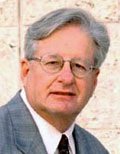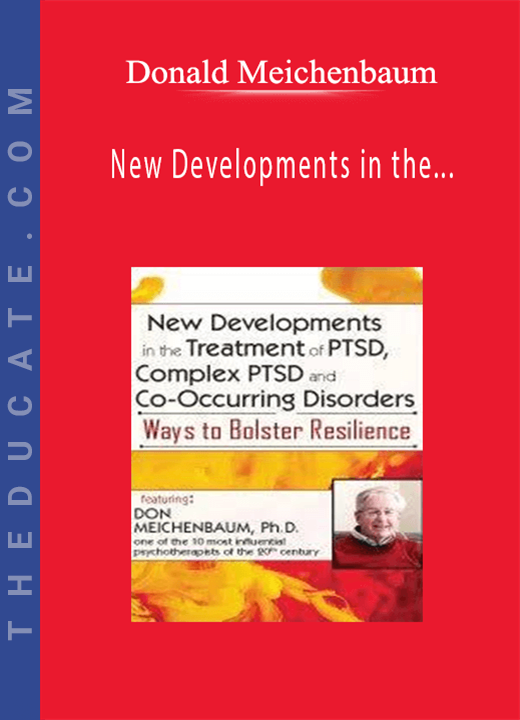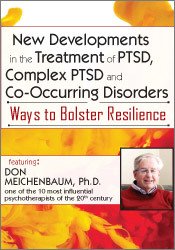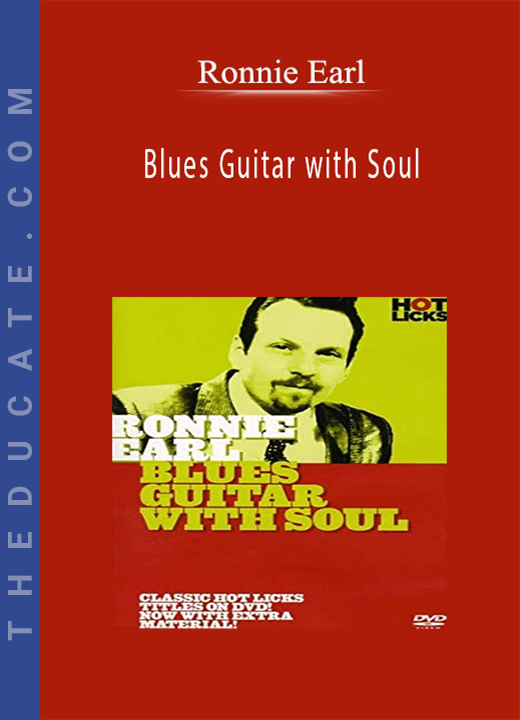Description
-
Donald Meichenbaum – New Developments in the Treatment of PTSD, Complex PTSD and Co-Occurring Disorders: Ways to Bolster Resilience
- Faculty:
- Donald Meichenbaum
- Duration:
- 5 Hours 50 Minutes
- Format:
- Audio and Video
- Copyright:
- Mar 10, 2017
Description
This is your opportunity to learn the latest developments in the treatment of PTSD, Complex PTSD and comorbid disorders from one of the world’s leading psychotherapists. Dr. Meichenbaum is a cofounder of Cognitive Behavior Therapy and he was voted “one of the 10 most influential psychotherapists of the 20th century.”
Watch this recording and learn the assessment and treatment implications of research findings on neuroscience and resilience. Learn how to use a Case Conceptualization Model that informs treatment decision-making and ways to implement the Core Tasks of Psychotherapy that “expert” therapists employ. You will learn how to provide integrated evidence-based therapy with clients who experience a variety of comorbid disorders including PTSD and Prolonged and Complicated Grief Disorders, suicidal behavior, Substance abuse disorder, Borderline Personality Disorder and Traumatic Brain Injuries. You will also learn how to integrate spiritually-based interventions and psychotherapy.
Dr. Meichenbaum will use his vast clinical and research experience, humorous, engaging, presentation style, along with video case presentations and provide a detailed and practical set of handouts with tools and techniques to be used in your practice.
Handouts
| Manual (12.55 MB) | 135 Pages | Available after Purchase |
Outline
THE NATURE AND IMPACT OF TRAUMA EXPOSURE: THE “UNTOLD STORY” OF RESILIENCE
-
Controversies in the field of PTSD and Complex PTSD: “State of the Art”
-
What distinguishes the 75% of individuals who evidence resilience VERSUS the 25% who develop persistent PTSD and related co-occurring disorders and adjustment difficulties
-
The nature and neurobiology of resilience: Implications for assessment and treatment
-
Constructive Narrative Treatment Perspective: How to help clients develop “healing stories” and accompanying coping strategies
-
What resilient individuals DO and do NOT do
-
A Case Conceptualization Model of risk and protective factors that informs treatment decision-making
SPECIFIC EVIDENCE-BASED INTEGRATED TREATMENT APPROACHES FOR CLIENTS WITH COMORBID DISORDERS
-
The Core Tasks of Psychotherapy: What “EXPERT” therapists do
-
PTSD is more than a Fear-based Anxiety Disorder: The role of guilt, shame, disgust, anger, prolonged and complicated grief and moral injuries
-
Detailed clinical examples of INTEGRATED treatment with clients experiencing a variety of clinical disorders
-
Prolonged and Complicated Grief Disorder
-
Borderline Personality Disorder
-
Suicidal behavior
-
Substance abuse disorder (including how to integrate 12 AA step programs and ways to enhance Recovery Transition Coping skills)
-
Traumatic Brain Injuries and PTSD
-
HOW TO IMPLEMENT THE CORE TASKS OF PSYCHOTHERAPY
-
Develop, maintain and monitor a therapeutic alliance
-
Treatment-informed feedback
-
Collaborative goal setting using Motivational Interviewing to nurture hope and positive emotions
-
Psycho-education using a CLOCK metaphor
-
Teach intra- and interpersonal coping skills: Intervention guidelines on ways to increase the likelihood of treatment generalization
-
Bolster the client’s resilience in six domains: physical, interpersonal, emotional, cognitive, behavioral and spiritual
-
Integrate spirituality and psychotherapy
-
Address the needs of health care providers: Ways to bolster “vicarious resilience”
PRESENTATION OF A CLINICAL TOOL BOX TO BE USED IN YOUR PRACTICE
-
Detailed CLIENT-BASED Checklists
-
Coping strategies with Grief
-
Transition Recovery strategies from substance abuse
-
Consumer guidelines on how to evaluate treatment centers
-
12 step AA checklist
-
Spirituality-based activities assessment and others
-
Faculty

Donald Meichenbaum, Ph.D. Related seminars and products: 7
Research Director
The Melissa Institute
Don Meichenbaum, Ph.D. is Distinguished Professor Emeritus from the University of Waterloo. Ontario from which he took early retirement 20 years ago. He is presently Research Director of the Melissa Institute for Violence Prevention in Miami (Please see www.melissainstitute.org). He is one of the founders of Cognitive Behavior Therapy.
In a survey of clinicians reported in the American Psychologist, he was voted “one of the ten most influential psychotherapists of the 20th century.” He has received a Lifetime Achievement Award from the Clinical Division of the American Psychological Association and he was Honorary President of the Canadian Psychological Association.
He has presented in all 50 U.S. states and internationally. He has published extensively and most recently published Roadmap to Resilience: A Guide for Military Trauma Victims and Their Families (visit www.roadmaptoresilience. org). His other books include Treatment of Individuals with Anger Control Problems and Aggressive Behavior; Stress Inoculation Training; Facilitating Treatment Adherence; and The Unconscious Reconsidered.
He has consulted for various populations including veterans’ hospitals, the National Guard, psychiatric treatment centers for children, adolescents and adults, treatment center for individuals with traumatic brain injuries, torture victims, Native populations, deaf populations and school boards. See papers by Dr. Meichenbaum on www.melissainstitute.org (go to home page and click on Author’s Index and scroll to Meichenbaum).
Speaker Disclosures:
Financial: Donald Meichenbaum is Research Director of the Melissa Institute for Violence Prevention and Treatment. He is the Distinguished Professor Emeritus for the University of Waterloo, Ontario, Canada. Dr. Meichenbaum receives a speaking honorarium from PESI, Inc.
Non-financial: Donald Meichenbaum has no relevant non-financial relationship to disclose.







12 reviews for New Developments in the Treatment of PTSD, Complex PTSD and Co-Occurring Disorders: Ways to Bolster Resilience – Donald Meichenbaum
There are no reviews yet.